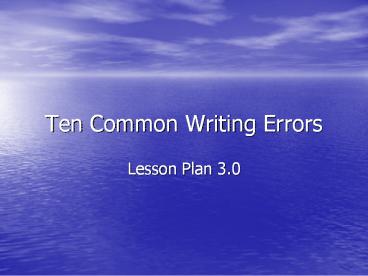Ten Common Writing Errors - PowerPoint PPT Presentation
Title:
Ten Common Writing Errors
Description:
Ten Common Writing Errors Lesson Plan 3.0 Fragments A full sentence has a subject and a verb that make sense by themselves. Fragments are usually Dependent Clauses or ... – PowerPoint PPT presentation
Number of Views:123
Avg rating:3.0/5.0
Title: Ten Common Writing Errors
1
Ten Common Writing Errors
- Lesson Plan 3.0
2
Fragments
- A full sentence has a subject and a verb that
make sense by themselves. - Fragments are usually Dependent Clauses or
phrases that need additional information to make
sense. - Attach the fragment to the beginning or end to
the most closely related sentence - Attach the fragment to a newly created sentence
- Supply the missing subject and/or verb, changing
the other words as necessary
3
Comma Splices and Run-Ons
- This commonly happens when a writer attempts to
connect too much information together - Complex-Compound sentences need to be rarely
used. This is also true for simple sentences. - When this happens, just break the sentence down
into two or more sentences. - Look for the subject and verb of a main idea.
- Use a semicolon to connect two very closely
related ideas, use a comma and a conjunction to
connect two Independent clauses, or turn one of
the sentences into a dependant clause/phrase.
4
Faulty Subject-Verb Agreement
- This occurs when the writer mistakenly uses a
singular or plural verb when the other is needed. - The documents was found.
- The documents were found.
- The basic rule of thumb is that if you are
dealing with a single item use the single verb. - Tip Substitute a pronoun for the subject. Is it
singular or plural? Use the appropriate verb form.
5
Faulty Pronoun Agreement
- If you have two or more subjects, you need to use
a plural pronoun. They Their Them - If you have one subject, you need to use a
singular pronoun. She He It. - Collective Nouns The Team uses a singular
pronoun it - Indefinite Pronouns Neither, anybody, each, no
one, one, nothing, somebody, and something are
singular - To avoid sexist language use plurals
- Neither of the executives resigned his position.
- The executives did not resign their positions.
- Stay within the same person point of view.
- To register to vote, citizens third person can
visit the state governments website, where you
second person can download the appropriate
forms. - I You They
6
Misplaced and Dangling Modifiers
- A modifier is a word or group of words that
describes something else. It modifies our
understanding of something. Sometimes authors
misplace sentence modifiers creating confusing
sentences. - Television stations carried the story of the
disastrous tornado throughout the nation. - Faded and brittle with age, archaeologists
unearthed a painted clay pot near the riverbank. - Passengers complained about the flight at the
customer service desk, which was turbulent and
delayed. - Modifiers need to be next to what they are
modifying.
7
Faulty Parallelism
- Words in a pair or series should be in parallel
or matching grammatical structures. - After hiking all day, the campers were exhausted,
hungry, and experienced soreness. - Every road to the airport is either jammed or is
closed for repairs. - We knew that autumn was on its way because the
leaves were changing color, the sun was setting
earlier, and there was a chill in the air.
8
Comma Misuse
- The comma is the most common mark of internal
punctuation. - Used when two complete sentences are joined with
a conjunction. - To set aside introductory material which precedes
a sentences main subject and verb. - When a word or phrase describes a noun but isnt
crucial for identifying the noun. - When words or phrases inserted into the body of a
sentence can be removed without significant loss
of meaning. Interrupters are enclosed in commas. - In a list of three or more items
- Before short quotations and their source.
- Mom said, Hey get over here.
- Between the numbers in a date and elements in an
address
9
Apostrophe
- Used to indicate missing letters or contractions
- Cant / Wont / Im
- Used to indicate possession
- Rosss / hers /The televisions knob
- Some plurals
- As
10
Homonyms
- Words that sound alike but mean different things
- Accept receive or agree vs. Except but or
excluding - To toward vs. Too overly vs. Two 2
- Affect influence vs. Effect result or bring
about - Its possessive vs. Its it is
- Than comparison vs. then time
- Their possessive vs. there place
- Your possessive vs. Youre you are
- Whose possessive? vs. Whos who is/has































